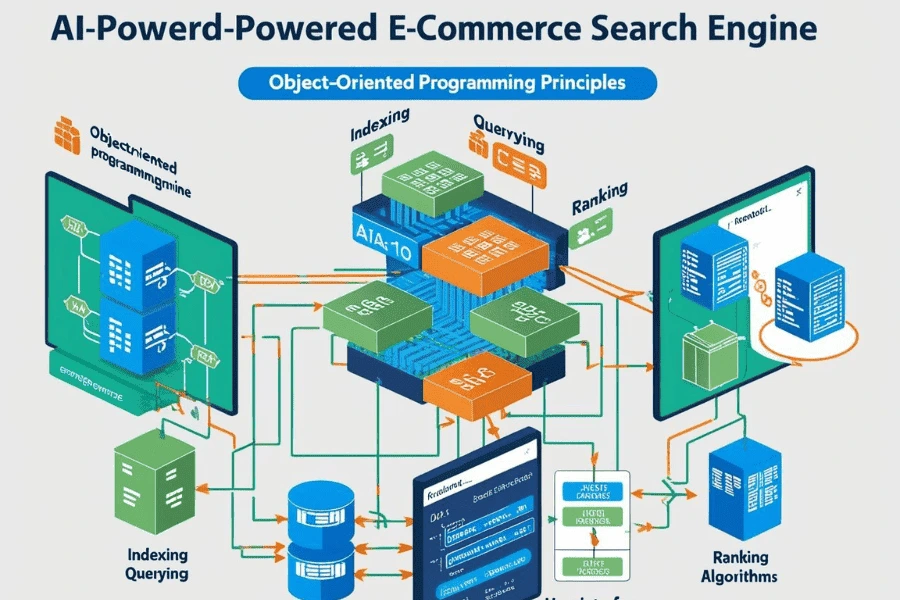Architecting AI-Powered Search Engines for E-commerce Using OOP Principles
Introduction
Search engines are the beating heart of modern e-commerce platforms. Customers rely on fast, relevant, and personalized search experiences to discover products, compare options, and make informed buying decisions. To deliver this, companies are increasingly turning to AI-powered search engines that incorporate machine learning, natural language processing (NLP), and recommendation algorithms. However, the underlying software architecture must be robust, scalable, and maintainable—making Object-Oriented Programming (OOP) an essential foundation. OOP principles help developers design modular, reusable components that support the evolving needs of intelligent search systems in online retail.

The Complexity of E-commerce Search
Unlike general web search, e-commerce search requires deep understanding of product data, user intent, inventory, pricing, and customer behavior. AI adds further complexity with its dynamic algorithms for query understanding, ranking, filtering, and personalization. Managing this complexity demands a clear architectural approach. With OOP, teams can break down large systems into manageable objects—like query parsers, recommendation engines, and ranking modules—each with a single responsibility and well-defined interactions.
OOP Components of an AI-Powered Search System
An AI-enhanced search engine for e-commerce can be composed of multiple OOP classes, each handling a specific task. For example:
- QueryParser: A class that cleans, tokenizes, and semantically analyzes user queries using NLP models.
- SearchIndex: Responsible for managing structured product data and handling full-text indexing (e.g., via Elasticsearch or Solr).
- RankingEngine: Applies AI-based scoring and learning-to-rank (LTR) models to sort search results based on relevance and user behavior.
- PersonalizationModule: Tailors results based on user profiles, purchase history, and browsing patterns.
- ResultAggregator: Combines and formats results from various sources (e.g., category, brand, price filters) into a unified response.
Applying OOP Principles to Improve Modularity and Maintainability
OOP principles like encapsulation, inheritance, and polymorphism are particularly powerful in AI-driven search engines:
- Encapsulation ensures that each module handles its logic internally. For instance, the RankingEngine might encapsulate different algorithms such as logistic regression, BERT embeddings, or collaborative filtering, and switch between them based on context.
- Inheritance allows developers to extend base classes for specific marketplaces or verticals. A generic QueryParser can be extended into FashionQueryParser or ElectronicsQueryParser with domain-specific improvements.
- Polymorphism enables flexible interaction between different modules. For example, various ScoringStrategy implementations can be plugged into the ranking system without changing the outer logic.
Scalability and Integration in the Cloud
Most e-commerce search engines operate in cloud-native environments. OOP-designed components can be packaged as microservices or deployed in containers, allowing for horizontal scaling and isolated upgrades. For instance, the SearchIndex class can be deployed as a scalable indexing service, while RankingEngine instances can run in parallel to serve large volumes of queries.
OOP also makes integration with external AI services easier. A class-based architecture allows developers to wrap third-party APIs (e.g., Google Vision, OpenAI embeddings, AWS Comprehend) into well-defined interfaces, abstracting the implementation and enhancing maintainability.
Monitoring, Testing, and Feedback Loops
With each component clearly defined via classes and interfaces, testing becomes more effective. Developers can write unit tests for each module, mock dependent services, and benchmark performance. Moreover, AI-powered search engines rely heavily on feedback loops—tracking user interactions like clicks, conversions, and bounce rates to improve relevance. OOP facilitates the creation of AnalyticsTracker and FeedbackCollector classes that integrate directly into the ranking pipeline, enabling A/B testing and model iteration.
Conclusion
Architecting AI-powered search engines for e-commerce requires balancing the complexity of AI models with the need for scalable and maintainable software. Object-Oriented Programming provides a robust framework for building these intelligent systems. By structuring search engine components as modular classes with clear responsibilities and flexible interfaces, OOP enables rapid innovation, seamless integration, and long-term sustainability. As consumer expectations rise and AI capabilities expand, OOP will remain a cornerstone for designing intelligent, adaptable e-commerce search experiences.
Active Events
3 mistakes aspiring data scientist should avoid
Date: October 1, 2024
7:00 PM(IST) - 8:10 PM(IST)
2753 people registered
Best Tips To Create A Job-Ready Data Science Portfolio
Date: October 1, 2024
7:00 PM(IST) - 8:10 PM(IST)
2753 people registered
Bootcamps
Data Science Bootcamp
- Duration:8 weeks
- Start Date:October 5, 2024
Full Stack Software Development Bootcamp
- Duration:8 weeks
- Start Date:October 5, 2024
